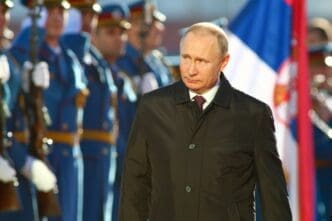Russian President Vladimir Putin has expressed “reservations” about a proposed 30-day ceasefire in the ongoing conflict in Ukraine as a U.S. envoy arrives in Moscow to discuss the plan further.
Despite describing the U.S. ceasefire proposal as “great and correct,” President Putin highlighted several concerns that warrant discussion before reaching an agreement. The timing coincides with the arrival of U.S. special envoy Steve Witkoff, who is in Moscow to present the peace plan’s details.
The ceasefire proposition, which Ukraine has already agreed to, was discussed during talks in Saudi Arabia. While the initiative aims to halt hostilities along the entire frontline, Putin emphasized the need for a lasting peace that addresses the conflict’s root causes. Previous statements from the Kremlin have pointed to the current Ukrainian government as a fundamental issue in the ongoing strife.
One of the key issues raised by Putin revolves around the verification of the ceasefire and accountability. He questioned the logistics in the Russian region of Kursk, where Ukrainian forces still control some areas. “What will happen in Kursk if we stop military actions for 30 days? Will everyone simply leave without a fight after committing numerous crimes against civilians?” Putin inquired, reiterating his stance that the region remains under Russian control after isolating the invading groups.
The Kremlin’s skepticism is echoed by Kremlin aide Yuriy Ushakov, who expressed doubts about the ceasefire, characterizing it as a temporary reprieve for Ukraine’s military. Ushakov communicated this position to U.S. National Security Adviser Michael Waltz, stating that Russia seeks a long-term peaceful resolution. However, Kremlin spokesperson Dmitry Peskov clarified that Ushakov’s statements do not equate to a rejection of the U.S. proposal; further information is awaited before any definitive decision is made.
On the subject of international military presence, Russian foreign ministry spokesperson Maria Zakharova emphasized that Russia finds foreign troops in Ukraine unacceptable under any circumstances. “For us, deploying foreign armaments in Ukraine under any flag is absolutely unacceptable,” Zakharova asserted, hinting at possible Russian retaliation should peacekeeping operations arise.
The conflict’s complexity is further demonstrated by recent Russian military actions, reportedly recapturing Sudzha in the Kursk region. Although a relatively minor settlement, the offensive marks a significant victory for Russia and represents pressure on Kyiv to negotiate an end to the war.
In summary, the proposed ceasefire in Ukraine presents both potential and challenges, as highlighted by President Putin’s concerns over logistical, political, and military implications. As diplomatic efforts continue, the onus is on further dialogue to bridge the gap between immediate cessation of hostilities and long-term peace.








